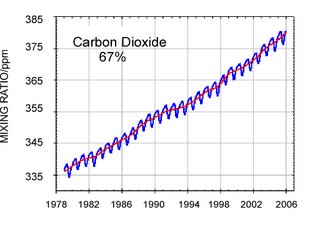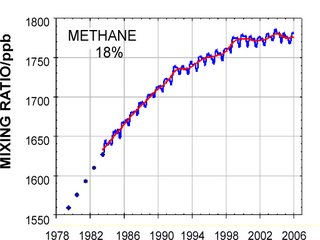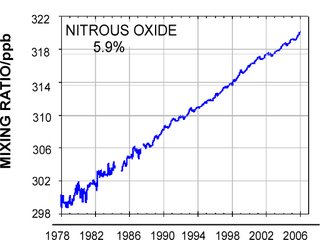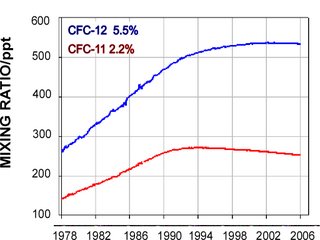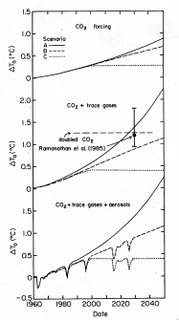A List for James Inhofe.... What would Spencer have said if he was contacted? It’s interesting to note that both he and the other skeptic E talked with had mixed reactions to An Inconvenient Truth. Asked if the film was scientifically accurate, Spencer said, “Partly yes and partly no. His explanation of global warming theory was very good. He correctly showed that the planet is warmer now than it has been in hundreds of years. But Gore said ‘thousands,’ and the National Academy of Sciences report says we know only that it is warmer than any time in the last 400 years. Gore repeatedly buys into the most catastrophic views and presents them as fact. And he incorrectly makes it appear as if extreme weather is increasing with global warming.” But many scientists do believe that hurricane strength is affected by warmer water. Does Gore’s film go beyond that? “He shows all these things that happen naturally, ice calving off and falling into the ocean, for instance, droughts and floods—and implies that it is all related to global warming,” Spencer said. He also claimed that only two of the five scientists interviewed in Borenstein’s piece were actually climate scientists.
Update 6/4/07
Welcome to our new friends from Planet Gore. You might be interested in some further comments on An Inconvenient Truth such as "The lag between temperature and CO2 (Gore's got it right)" and Glaciers (Al Gore got it right), and oh yes, sea level. For those wanting more details about the IPCC sea level rise statments, and why Gore's statement are not in disagreement with the latest IPCC report we have more from someone involved in drafting the IPCC report. More references on request.
Update 7/4
18. In the department of you take it from whence it comes we have Roy Spencer:
17. Judith Curry
"You cannot blame any single storm or even a single season on global warming. ... Gore's statement in the movie is that we can expect more storms like Katrina in a greenhouse-warmed world. I would agree with this," said Judith Curry. She is chairwoman of Georgia Tech's School of Earth and Atmospheric Sciences, and is co-author, with Mr. Webster, Mr. Holland and H.R. Chang, of a paper titled "Changes in Tropical Cyclones," in the Sept. 16 issue of Science, a weekly publication of the American Association for the Advancement of Science."UPDATE 6/30
16. I'll go out on a limb with Bob Watson, chief scientist of the World Bank and former head of the IPCC.
UPDATE 6/29:
15. Dr. Jeffrey Masters, meteorologist posted a review on his blog. Disagreed about the Katrina bit, but what the hell, he is a meteorologist
-------------------------------------
Senator James Inhofe is demanding that AP provide him the names of the 19 atmospheric scientists who told the press agency that the science in "An Inconvenient Truth" was accurate. I have gone through a number of articles and put together a list of the first 14 that I could find.
Here is a chance for climate scientists to step up to the plate. If you agree with Jim Hansen, Robert Corell, Eric Steig, and the others listed below, put your name, some indication of your expertise and any other words you may wish into the comments. I will move them up into the text, and we will have our own little list. The only rule is that you MUST be a climate scientist, or in a closely related field and have seen the movie or read the book.
1. James Hansen, NASA/GISS, - NY Review of Books
Indeed, Gore was prescient. For decades he has maintained that the Earth was teetering in the balance, even when doing so subjected him to ridicule from other politicians and cost him votes. By telling the story of climate change with striking clarity in both his book and movie, Al Gore may have done for global warming what Silent Spring did for pesticides. He will be attacked, but the public will have the information needed to distinguish our long-term well-being from short-term special interests.
2. Robert Corell, chairman of the worldwide Arctic Climate Impact Assessment - source AP
"I said, 'Al, I'm absolutely blown away. There's a lot of details you could get wrong.' ... I could find no error."3. William Schlesinger, dean of the Nicholas School of Environment and Earth Sciences at Duke University. "Excellent. He got all the important material and got it right." - source AP
4. Karen Bice, an associate scientist at the Woods Hole Oceanographic Institution,
..saw Gore's film last week in New York City. As a scholar in paleoclimatology - the study of past climates - Bice said she was impressed with Gore's knowledge and said information presented in the documentary was factual. - Cape Cod On Line5. "I saw it last night and was impressed with the climate science presented in the film," said David Archer, a climatologist at the University of Chicago. - Inter Press Service
6. Eric Steig University of Washington geochemist in Real Climate
How well does the film handle the science? Admirably, I thought. It is remarkably up to date, with reference to some of the very latest research. Discussion of recent changes in Antarctica and Greenland are expertly laid out. He also does a very good job in talking about the relationship between sea surface temperature and hurricane intensity. As one might expect, he uses the Katrina disaster to underscore the point that climate change may have serious impacts on society, but he doesn't highlight the connection any more than is appropriate (see our post on this, here).7. Dr. Gavin Schmidt, NASA/GISS climate modeler in Salon
"Such an amount of relatively hard science could have been extremely dull, and I've been to a lot of presentations on similar stuff that were very dull," says Schmidt. "Where there was solid science, he presented it solidly without going into nuts and bolts, and where there were issues that are still a matter of some debate, he was careful not to go down definitively on one side or the other."8. Lonnie Thompson, a professor at Ohio University, - in Salon
whose work on retreating glaciers from the Andes to Kilimanjaro and Tibet is featured in the film, was happy with the result. "It's so hard given the breadth of this topic to be factually correct, and make sure you don’t lose your audience," he says. "As scientists, we publish our papers in Science and Nature, but very few people read those. Here's another way to get this message out. To me, it's an excellent overview for an introductory class at a university. What are the issues and what are the possible consequences of not doing anything about those changes? To me, it has tremendous value. It will reach people that scientists will never reach."9. John Wallace, of the University of Washington, in Salon
"I think that he's gone to great lengths to make the science comprehensible to the layman," he says. "Given the fact that this was a film intended to bring the message to the lay public, I think it was excellent."10. David Battisti, a University of Washington scientist in the Seattle Pilot
There are some minor things I might nitpick, but they don't detract from the overall message," said .11. At a screening organized by EPA scientists and engineers:
12. continuingBob Hall -- chief of EPA's air pollution technology branch, which does research on pollutants emitted by boilers and engines -- called the film an eye-opener.
"There is a little bit of politics in it," Hall said of the film. "Overall, it's more factual. I think he is doing a good public service if the public will watch it."....
Like her colleagues, Geri Dorosz, an environmental scientist, said the fact that the movie will bring the issue to a wider audience was inspiring.
"He is preaching to the choir here," Dorosz said. "Now, if he could preach to some of those that are singing out of tune."
13. Richard Gammon, another UW climate change expert, said the film could be "pretty shocking" for people who are in denial about global warming and see the movie as their first exposure to the evidence.
He doesn't criticize the science in the movie, but wished "it could have ended on a more positive note and talked a bit more about solutions." in the Seattle Pilot
14. And perhaps most touchingly in a tribut to Yoram Kaufman, the chief atmospheric scientist at NASA/Goddard, who was killed while riding his bike Laurie David saidIn a fitting tribute, Yoram's NASA colleagues have arranged for a special memorial screening of "An Inconvenient Truth" to honor Yoram. The screening is open to the public....Let's go
NASA and other scientific agencies around the world observed a moment of silence during his memorial service on Sunday. The tribute even extended into space, where data collection on two satellite spacecraft ceased for the moment of remembrance.


 f(co), where f(c) = 4.996 ln (c + 0.0005c2). c
f(co), where f(c) = 4.996 ln (c + 0.0005c2). c